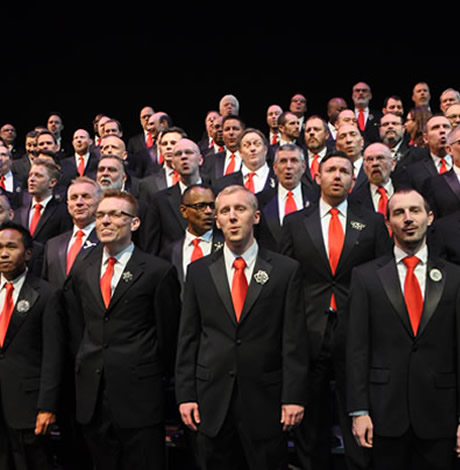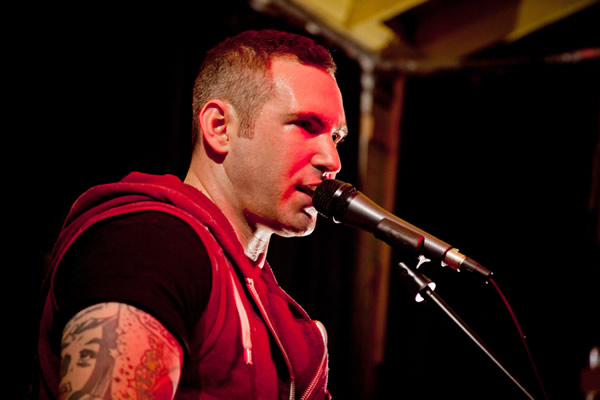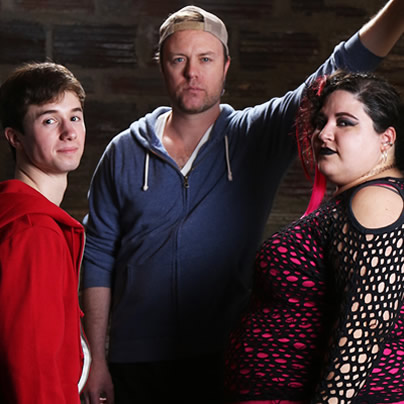Arts & Entertainment
Mixing it up
Get as basic or elaborate as you wish at new yogurt parlor
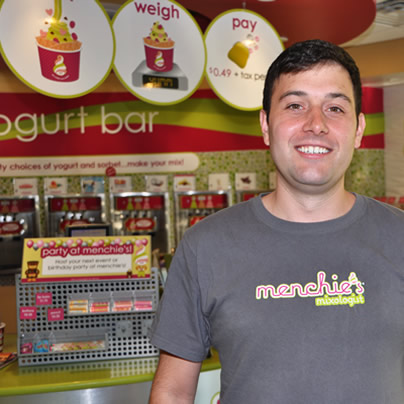
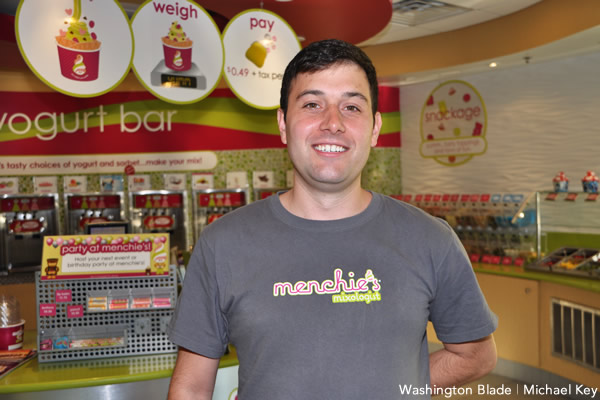
Bryan DeRosa of Menchie’s on U Street. (Washington Blade photo by Michael Key)
If variety is the spice of life, new frozen yogurt shop Menchie’s (1939 12th Street, N.W.) has it in spades with 14 rotating flavors, nearly 50 toppings and the chance to get as much or as little as you want.
Danna and Adam Caldwell founded the Encino, Calif.-based chain, which offers self-serve frozen yogurt with a wide selection of toppings. The name Menchie’s comes from the Yiddish word mensch, meaning “good person.” Each person at a Menchie’s franchise wants to help the guest have a positive experience, enjoy their mix and come back for more.
Menchie’s has nearly 100 rotating flavors including a range of regular, low carb, low sugar and non-dairy yogurts. Menchie’s also has its own private label of yogurt allowing its staff to develop their own flavors and distinguish themselves from other frozen yogurt establishments throughout the United States. Menchie’s frozen yogurts include live and active cultures (a digestive aid not often found in frozen yogurt) and meet quality standards established by the National Yogurt Association.
When one walks into the playful store on 12th Street between T and U streets, it’s easy to get excited. I felt like a naughty child filling sample cups with one of the 14 flavors (or two flavors swirled together), something one is encouraged to do before deciding. Each flavor seemed better than the last and the more I tried, the harder the decision became.
But before I put myself into a self-induced diabetic coma, I stopped tasting and decide on a flavor. I chose the red velvet, a rich and creamy yogurt that replicated the flavors of my favorite cake incredibly well. I topped it with a bit of coconut and some white chocolate chips. My husband decided to go with half a cup of chocolate and vanilla snow swirl and half a cup of Dole pineapple and coconut swirl, with a bit of strawberry topping. We paid — 39 cents per ounce — and sat inside, though outdoor seating is also available.
As we sat, shop owner and friend Anthony Aligo, who’s gay along with his business partner Bryan DeRosa, pulled up a chair and joined us. Seeing that my husband had two distinctive flavors in his cup, Aligo said, “I’m looking into getting cup dividers so that you can have his-and-her cups, or just keep your flavors from touching.”
Aligo is clearly a man after my own heart, because I would have had another flavor, but I didn’t want it touching my red velvet concoction. Aligo spoke excitedly about the flavor options, the toppings, and even showed us a picture of the biggest cup of frozen yogurt he’s seen so far — a mile-high mix of flavors and toppings costing a little over $18.
“She walked out of the store with it, but I was just worried it was going to topple over onto the ground, I don’t even know if she managed to eat all or any of it,” he said.
Aligo opened Menchie’s because “he wanted a place for our LGBTQ family to be able to congregate and socialize as well as cater to our youth so that they always have a safe place to be.”
His favorite thing about the store is to be out from behind the counter and socializing with the customers. He’s working hard on outreach, partnering with local businesses as well as organizations like SMYAL so Menchie’s can live up to his vision. He says business has been strong since the July opening.
Menchie’s is open Sunday through Thursday from 11 a.m.-11 p.m. and Friday and Saturday from 11a.m. to midnight.
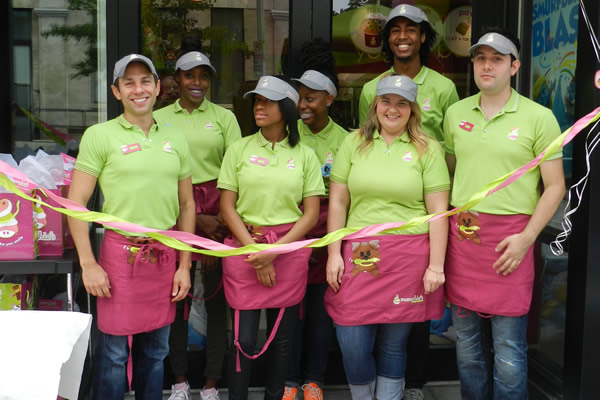
Menchie’s on U Street owner Anthony Aligo (far left), store manager Sarah Null (second from the right front row) and store owner Bryan DeRosa (far right) with other employees. (Photo courtesy of Menchie’s on U Street)

‘A Wrinkle in Time’
Through July 20
Arena Stage
1101 Sixth St., S.W.
Tickets range from $59-$209
Arenastage.org
Currently at Arena Stage, talented out actor and singer Taylor Iman Jones is rekindling an old friendship with an adored character of fiction.
Broadway vet Jones is starring as 13-year-old Meg Murry in “A Wrinkle in Time,” the world-premiere musical adaptation of Madeleine L’Engle’s same-titled book.
For many readers, especially women, the classic 1962 young adult novel, was their first foray into sci-fi, particularly one with a female protagonist.
The story centers on Meg, an awkward schoolgirl whose physicist father has mysteriously disappeared. Now, Meg, her popular friend Calvin, and smart younger brother Charles Wallace are tasked with moving through time and space to find him. Along the way they encounter adventure and evil.
For Jones, 33, playing 13-year-old Meg feels freeing in ways. She says, “As you get older, you’re told to grow up, so I like letting go of some of that. To feel feelings in their rawest form and to tap back into that is fun. I like the spontaneity. There are highs and lows to revisit.”
Born and raised in the San Francisco Bay Area, Jones began piano lessons at just six and soon added band and plays to their pursuits. Following high school, she made a deep dive into California theater for seven years before making the big move to New York in 2017 where after just two months she was singing on Broadway.
The determined and appealing Jones, who lives in New York with their partner, boasts an impressive bio. She has appeared on Broadway as Catherine Parr, Henry VIII’s sixth and final wife in Six, and in the original casts of “Head Over Heels” and “Groundhog Day.” She’s been seen in national tours of “Hamilton” and “American Idiot.”
WASHINGTON BLADE: It seems “A Wrinkle in Time” and Meg mean a lot to a lot of people.
TAYLOR IMAN JONES: The book tells the story of a girl with so much undiscovered power who’s accomplishing things she never imagined that she could.
BLADE: Can you relate?
JONES: Meg wears her emotions on her sleeve. I can certainly relate to that. I’m a Pisces. Sometimes being hyperemotional and very empathetic can feel like a burden, but as I’ve matured, I have realized that it’s not a bad quality. And it’s something I’ve learned to harness and to enjoy. I love that I can play a role like Meg in front of thousands of people.
BLADE: Was “Wrinkle in Time” a book you knew well?
JONES: Oh yeah, it’s a favorite book that lives in my heart and my mind. It’s one of the first books that taught me about the adventure of reading.
BLADE: And playing a favorite character must be a kick.
JONES: It really is.
BLADE: Meg is a big part in a big show.
JONES: This musical is huge. They’re traveling through space and meeting people on different planets. 20-person cast. 30 songs in the show. Quite the undertaking and I’m proud of us. I’m on stage for the entire musical and I sing four or five numbers.
As a mezzo soprano I guess you’d say I have the luxury of being able to do a lot of musicals that span a lot of different genres: rock musical, pop musical, and standards. “A Wrinkle in Time” is contemporary musical theater.
For me, singing is probably the least difficult part of the show. What’s harder for me is the way Meg experiences trauma; I need to be careful when I’m screaming and yelling.
BLADE: It seems mostly women have been involved in making this production happen (book by Lauren Yee; music and lyrics by Heather Christian; directed by Lee Sunday Evans; and choreography by Ani Taj.)
JONES: It’s true, the director, writer, etc., and most of our producers are all women. This doesn’t happen most of the time. For me it means new ideas and fresh energy, and pushing the limits of musical theater.
It’s also created a wonderful space in which to work. It can be more generous, and understanding. And centering the story on a young girl is something we can all relate to.
BLADE: Will “A Wrinkle in Time” resonate with queer theatergoers and their families?
JONES: I think so, especially on the heels of pride month. It’s truly a show for all ages about finding your inner strength and fighting for the things that you love; not letting evil win over the power of good, and not just for yourself but for those around you too.
Movies
Two new documentaries highlight trans history
‘I’m Your Venus’ on Netflix, ‘Enigma’ on HBO/Max

One of the most telling things about queer history is that so much of it has to be gleaned by reading between the lines.
There are the obvious tentpoles: the activism, the politics, the names and accomplishments of key cultural heroes. Without the stories of lived experience behind them, however, these things are mere information; to connect with these facts on a personal level requires relatable everyday detail — and for most of our past, such things could only be discussed in secret.
In recent decades, thanks to increased societal acceptance, there’s been a new sense of academic “legitimacy” bestowed upon the scholarship of queer history, and much has been illuminated that was once kept in the dark. The once-repressed expressions of our queer ancestors now allow us to see our reflections staring back at us through the centuries, and connect us to them in a way that feels personal.
One of the most effective formats for building that connection, naturally enough, is documentary filmmaking — an assertion illustrated by two new docs, each focused on figures whose lives are intertwined with the evolution of modern trans culture.
“I’m Your Venus,” now streaming on Netfllix, bookends an iconic documentary from the past: “Paris is Burning (1990), Jennie Livingston’s seminal portrait of New York City’s ballroom scene of the ‘80s. In that film, a young trans woman named Venus Xtravagana delivered first-person confessionals for the camera that instantly won the hearts of audiences — only for them to break with the shattering revelation that she had been murdered before the film’s completion.
That 1988 murder was never solved, but Venus — whose surname was Pellagatti before she joined the House of Xtravaganza – was never forgotten; four decades later, her family (or rather, families) want some answers, and filmmaker Kimberly Reed follows her biological siblings — Joe, Louie, and John, Jr. — as they connect with her ballroom clan in an effort to bring closure to her loss; with the help of trans advocates, they succeed in getting her murder case re-opened, and work to achieve a posthumous legal name change to honor her memory and solidify her legacy.
It’s a remarkably kind and unapologetically sentimental chronicle of events, especially considering the brutal circumstances of Venus’ killing — a brutal death by strangling, almost certainly perpetrated by a transphobic “john” who left her body hidden under a mattress in a seedy hotel — and her decision to leave her birth family for a chosen one. As to the latter, there are no hard feelings among her blood relatives, who assert — mostly convincingly — that they always accepted her for who she was; one senses that a lot of inner growth has contributed to the Pallagatti clan’s mission, which admittedly sometimes resembles an attempt at making amends. For the murder itself, it’s best to leave that part of the story unspoiled — though it’s fair to say that any answers which may or may not have been found are overshadowed by the spirit of love, dignity, and determination that underscore the search for them, however performative some of it might occasionally feel. Ultimately, Venus is still the star of the show, her authentic and unvarnished truth remaining eloquent despite the passage of more than 40 years.
Perhaps more layered and certainly more provocative, documentarian Zackary Drucker’s “Enigma” (now streaming on HBO/Max) delves further back into trans history, tracing the parallel lives of two women — trans pioneer and activist April Ashley and self-styled European “disco queen” Amanda Lear — whose paths to fame both began in Paris of the 1950s, where they were friends and performers together at Le Carrousel, a notorious-and-popular drag cabaret that attracted the glitterati of Europe.
Ashley (who died at 86 in 2021) was a former merchant seaman from Liverpool whose “underground” success as a drag performer funded a successful gender reassignment surgery and led to a career as a fashion model, as well as her elevation-by-wedding into British high society — though the marriage was annulled after she was publicly outed by a friend, despite her husband’s awareness of her trans identity at the time of their marriage. She went on to become a formidable advocate for trans acceptance, and for environmental organizations like Greenpeace, who would earn an MBE for her efforts, and wrote an autobiography in which she shared candid stories about her experiences and relationships as part of the “exotic” Parisian scene from which she launched her later life.
The other figure profiled by “Enigma” — and possibly the one to which its title most directly refers — is Amanda Lear, who also (“allegedly”) started her rise to fame at Le Carrousel before embarking on a later career that would include fashion modeling, pop stardom, and a long-term friendship with surrealist painter Salvador Dalí. A self-proclaimed “disco queen” whose success in Europe never quite spread to American culture (despite highly public associations with musical icons like David Bowie and Roxy Music), Lear’s trajectory has taken her in a different direction than Ashley’s. In the film’s extensive live interview segments, she repeatedly denies and discredits suggestions of her trans identity, sticking to a long-maintained script in which any and all details of her origins are obscured and denied as a matter of course.
At times, it’s almost amusing to observe her performative (there’s that word again) denials, which occasionally approach a kind of deliberate “camp” absurdity in their adamance, but there’s also a kind of grudging respect that’s inspired by the sheer doggedness with which she insists on controlling the narrative — however misguided it may seem to those of us on the outside. Debate about her gender-at-birth has continued for decades, even predating Ashley’s book, so the movie’s “revelations” are hardly new, nor even particularly controversial — but her insistence on discrediting them provides sharp contrast with the casual candor of Ashley’s elegantly confident persona, underscoring the different responses to transphobia that would direct the separate lives of both these former (alleged) friends.
For what it’s worth, Lear sent an email to the Washington Post, calling the movie “a pathetic piece of trash” and denying not just her trans identity but any friendship or association with Ashley, despite ample photographic and anecdotal evidence to the contrary — and while it might come across as callous or desperate for her to maintain the presumed façade, it’s a powerful testament to the power of cultural bullying to suppress the truth of queer existence; the contrast between the life each of these women chose to live speaks volumes, and makes “Enigma” into one of the most interesting — and truthful — trans documentaries to emerge thus far.
While neither film presents a comprehensive or definitive view of trans experience (is such a thing even possible, really?), both offer a perspective on the past which both honors the truth of queer existence and illustrates the ways in which the stigma imposed by mainstream prejudice can shape our responses to the identity through which we are perceived by the public.
That makes them both worth your attention, especially when our queer history — and the acknowledgement of trans existence itself — is at risk or being rolled right back up into the closet.
Sports
Trans cyclist’s victory sparks outrage in conservative media
Katheryn Phillips is originally from DC

On the heels of UPenn erasing the record of the first openly transgender NCAA Division I All-American swimmer and the U.S. Supreme Court’s decision to tackle bans on trans student-athletes, right wing media is now all hot and bothered about the latest trans woman who won a cycling championship — even though she competed according to the rules.
On Tuesday, 58-year-old Katheryn Phillips finished first in USA Cycling’s Lyons Masters National Championship race for women aged 55-59, with a time of 1:42:10, according to the official results posted by the organization. The record shows her gender as “F” for female.
One second behind Phillips was Julie Peterson, with a time of 1:42:11 — as were three other cyclists: Mary Beth Grier, Andrea Cherniak-Tyson, and Carolyn Maddox.
Peterson, 57, was so outraged, she told Fox News she refused to stand on the podium in second place next to Phillips. Her story was swiftly shared by the New York Post (also owned by Fox’s parent company News Corp.), the Daily Mail, Breitbart, and other conservative media.
Both Peterson and another competitor are accusing USA Cycling of “hiding” that a transgender woman had registered to race.
“It was hidden from us. Katheryn Phillips, KJ’s name, was not on that list. And I checked it up all the way to the point of closure when we couldn’t register online anymore,” Debbie Milne told Fox.
“If I had known, I wouldn’t have spent thousands of dollars in travel and time off work to come and do a race,” Peterson said. Fox welcomed Milne, 56, who finished seventh on Tuesday, to Fox & Friends Thursday morning.
(Video courtesy of Fox News)
Peterson told Fox she did complain to USA Cycling officials prior to the race. Both Milne and Peterson referred to Phillips as a male, and with “he/him” pronouns.
“To be fair to all humans, if we want to say ‘him’ or ‘her,’ he was born a biological male, that is a fact,” Milne said. “And that is the thing that makes it an unfair advantage. Whatever has happened after that is a whole different topic.”
“I said, ‘I don’t want to race against a man,’ and they quickly scolded me and said ‘Oh, you can’t call him a man,’ and I’m like ‘Well, he is a man,’ so I was quickly scolded and corrected that it is a woman and I don’t even know what to say.”
USA Cycling did not respond to the Washington Blade’s emails requesting comment.
Phillips, who goes by Kate and by “KJ,” is a former rugby player with the D.C. Furies, who stated in the comments of a 2024 article published by Zwift Insider that she was the first out trans athlete in the U.S. to compete under the 2004 International Olympic Committee’s guidelines on trans participation.
“When USA Rugby told me about the IOC decision in 2004, I raised my hand to be included. I experience nothing but joy when I play, ride, and race,” Phillips said.
As the Blade has reported, the International Olympic Committee drastically revised those rules in 2021, and in March, Republican lawmakers in D.C. demanded the IOC ban trans female athletes from women’s sporting events altogether.
The Blade also reached out to Phillips for comment but as of press time we have not received a response. She told Zwift Insider in March 2024 she does not let those who disapprove or spread hate impact her performance or her attitude.
“I am unaffected by dissent. I love, I share joy, I am me, and I have been my authentic self for decades,” she said. It’s been reported Phillips came out in 1999, and told Zwift Insider she considers herself a lifelong cyclist.
“I’ve been on a bike for as long as I can remember,” said Phillips. “As kids, my friends and I rode all over town, we were feral kids; no cell phones, no trackers … we just roamed, and nobody got in trouble or hurt bad enough not to ride home … Scrapes/bruises/cuts were not an issue for us. In my teens, I worked for myself as a court/legal messenger, doing all of the work via my bike until I got a car. Raced BMX as a kiddo (when I mowed lawns to cover the race entry fees), I did MTB stuff (non-racing) and Sprint/Olympic Triathlons in my 30’s, and now I’m racing on Zwift, Road/Gravel, and CX in my 50s.”
In the comments section, Phillips made clear she’s not competing to win.
“I don’t do sports for victory, I do it because like many other women, I am an athlete to my core,” she said. “Unlike some, I am not there to WIN, I am there to do my best with the competitors and teammates I have around me trying to do the same…we are in it for the experience. I rejoice in their wins, and a lot of joy is reflected back to me when I have a good day.”
-

 U.S. Supreme Court3 days ago
U.S. Supreme Court3 days agoSupreme Court to consider bans on trans athletes in school sports
-

 Out & About3 days ago
Out & About3 days agoCelebrate the Fourth of July the gay way!
-

 Virginia3 days ago
Virginia3 days agoVa. court allows conversion therapy despite law banning it
-

 Federal Government5 days ago
Federal Government5 days agoUPenn erases Lia Thomas’s records as part of settlement with White House

